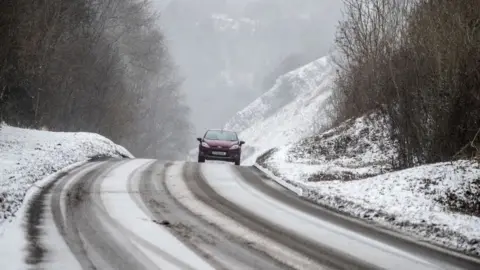Beast from the East costs councils millions for gritting
 Getty Images
Getty ImagesDisruption caused by the Beast from the East may be over - but it has left a multi-million pound dent in council budgets.
Caerphilly and Monmouthshire spent almost £900,000 between them in March and February, with the latter using double the salt in 2017-18 than it has in each of the past six years.
Storms and heavy snowfall have seen some councils seeking financial help.
The Welsh Local Government Association said budgets were hit hard.
A spokesman added: "Although all councils will have planned well in advance for such a weather event, they are now faced with significant additional costs incurred in responding to the recent period of extreme weather.
"Discussions are currently ongoing with Welsh Government to see if any potential support for local authorities may be available."
In February, temperatures plummeted to -5C as Wales was hit by a Siberian blast then at the start of March, an extreme weather warning was issued as the Beast from the East and Storm Emma caused problems.
Wales was again blanketed by snow in the middle of the month as a storm dubbed the "mini beast from the east" arrived.
The added cost pressure to Monmouthshire following cold periods in December, February and March was £450,000 and it has asked the Welsh Government for help covering it.
Caerphilly used an extra 2,200 tonnes of grit in February and March alone, spending £428,451.
This will be funded from council reserves, as will be the case in Torfaen, where 4,500 tonnes of salt was used over the winter - 1.5 times the usual amount.
The cold snap led to £244,000 more than budgeted being spent in 2017-18, which a spokesman admitted would have an impact on services going forward.
 PA
PARhondda Cynon Taf council spent between £300,000 and £400,000 over budget.
Its leader Andrew Morgan said: "A certain amount is budgeted each year but there was a snowfall before Christmas, one in early March and another that month.
"It is very unusual to have three and heavy plant machines were brought in because of the snow drifts.
"It took four to five days to clear one access road with 80 vehicles working (across the council area)."
Over three days from 1 March, Newport City Council spent an extra £120,412 responding to what was called a "weather crisis" by councillor Roger Jeavons.

The cash went on 1,110 tonnes of salt, with 1,581 staff hours spent and 6,882 miles covered by maintenance and support vehicles to ensure services could run.
Wrexham council does not keep a monthly breakdown but said it could be only the second time it has used more than 10,000 tonnes of grit in a year since 2005.
Ceredigion council expects its winter services bill for 2017-18 to exceed budget and a spokeswoman said discussions had started with the Welsh Government about financial assistance.
She said: "Responses to cold weather and snow events are particularly resource intensive and cannot be measured simply by calculating the amount of grit used.
"As many routes would have been treated by snow ploughs and snow blowers which would have not involved the deposition of grit.
"But the amount of grit spread on the network during the winter of 17-18 is already greater than the amount spread during 15-16 and 16-17 combined."
 Eluned Yaxley
Eluned YaxleyWales' biggest geographical local authority Powys has a 3,417 mile (5,500 km) road network plus 878 miles (1,414 km) of trunk roads to look after.
The cost of the severe weather has not yet been calculated but 1,300 tonnes of salt was being used a day, compared to the 550 tonnes usually spread.
Cardiff council had a 2,500 tonne stockpile of grit in place for the winter, and did not need to order any additional supplies.
From Wednesday 28 February to Monday 5 March it used 650 tonnes on more than 3,392 miles (5,460 km) of road.
A Welsh Government spokeswoman said it appreciated the hard work by council staff and contractors dealing with the cold weather.
She added: "The WLGA has co-ordinated the gathering of costs incurred by the local authorities as a result of the extreme weather event and these are currently being considered.
 Mooli/BBC Weather Watchers
Mooli/BBC Weather Watchers